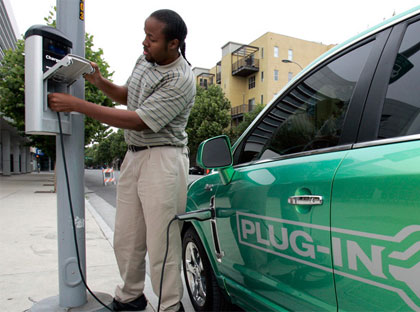Oxford Cancer Analytics raises $11M to detect lung cancer via a blood test
OXcan combines proteomics and artificial intelligence for early detection
Read more...

It’s 2010 and according to 1960-1989 science fiction movies, we should have robot slaves, jetpacks, matter transporters (tricky, as Jeff Goldblum demonstrated in “The Fly”), and hover cars. We’re not there yet, but we’re close. We don’t have hover cars, but we do have electric cars, which are about to see the dawn of a new era.
Coulomb Technologies, a leader in electric vehicle (EV) infrastructure, announced Wednesday a $15 million series C round of funding from previous investors Rho Ventures, Voyager Capital, Siemens Venture Capital GmbH, and Hartford Ventures, and new investors Harbor Pacific Capital and LS Cable Ltd., and LS Industrial Systems Co., Ltd.
The money will be used to further develop and expand Coulomb’s charging station network, ChargePoint, which has roadside charging stations in cities around the world, including New York City, Orlando, Detroit, Amsterdam, Sydney and Dublin.
The Campbell, Calif.-based company is currently setting up charging stations in nine regions throughout the United States as part of its strategic partnership with automobile manufacturers Ford, Chevrolet, and Smart USA. Regions include Austin, Detroit, Los Angeles, Sacramento, the San Jose/San Francisco Bay Area, Bellevue/Redmond, Wash., and Washington DC.
“Until recently, the electric car market has not been successful for two reasons,” said Coulomb senior vice president for worldwide sales Scott Saffian, in an interview with VatorNews. “Number one: There was no infrastructure so people had nowhere to recharge their vehicles, and number two: The price of gas had not reached the ‘ouch point’ yet.”
Coulomb got its start in 2007 in answer to the question of infrastructure. During his two terms as mayor of Cupertino, California, Coulomb CEO Richard Lowenthal had access to the all-electric Toyota RAV4, and it was love at first sight. But there was nowhere to recharge the vehicle. So when his stint as mayor was up, Lowenthal looked for a way to beef up the electric vehicle infrastructure, and the only way to do that was by creating a network.
The ChargePoint network was designed to be as quick and easy as swiping a card, and EV drivers can even use their iPhones to monitor how much life their battery has and where the next recharging station is located. The ChargePoint stations also have authentication features in place to ensure safe, secure transactions.
But as cool as all of this sounds (it would be cooler if we were talking about electric hover cars), what kind of demand is out there for electric charging stations right now?
“There aren’t enough electric cars on the street right now to be sure how many people Coulomb serves,” said Saffian. “But that’s going to change in the next 12 months when manufacturers start rolling out their new electric vehicles.”
Among those anticipated electric vehicles are the Nissan Leaf, the Chevrolet Volt, the Coda sedan, and Tesla's Model S, expected in 2012. The Nissan Leaf is scheduled to roll out in December 2010 (customers can reserve a Leaf now) and will be the world’s first mass-produced electric vehicle that, at $32,780, the average consumer can actually afford. Hertz, the rental car company, already has plans to offer the Leaf among its vehicle selection in the United States and Europe. The Leaf will get approximately 100 miles per charge, without running the air conditioner or the heater, so those charging stations will have to be plentiful.
Judging from Coulomb’s growth rate, there will be no shortage of charging stations. This year the company is on schedule to deliver up to 10,000 charging stations to regions throughout the United States, compared to 700 stations in 2009, according to Saffian. In 2011, the company predicts that it will be delivering up to 35,000 stations.
“Our growth is limitless,” said Saffian. “This is due in part to our self-sustaining business model. We see electricity as a transportation fuel.”
What this means is that a ChargePoint charging station functions like any ordinary gas station. The driver pays for the charge/fuel, and the investors who maintain the station receive a portion of the cut.
But Coulomb is not alone in the race to provide electric vehicle charging stations. EV-charging service provider Better Place has also been delivering stations throughout the United States and currently has a deal with Hawaii to provide a switch service, whereby a driver can pull into an EV-charging station and swap a used battery for a new, fully-charged one.
Coulomb’s future will become more visible when the electric vehicles begin rolling out this December.
Image source: theautochannel.com
OXcan combines proteomics and artificial intelligence for early detection
Read more...Nearly $265B in claims are denied every year because of the way they're coded
Read more...Most expect to see revenue rise, while also embracing technologies like generative AI
Read more...
